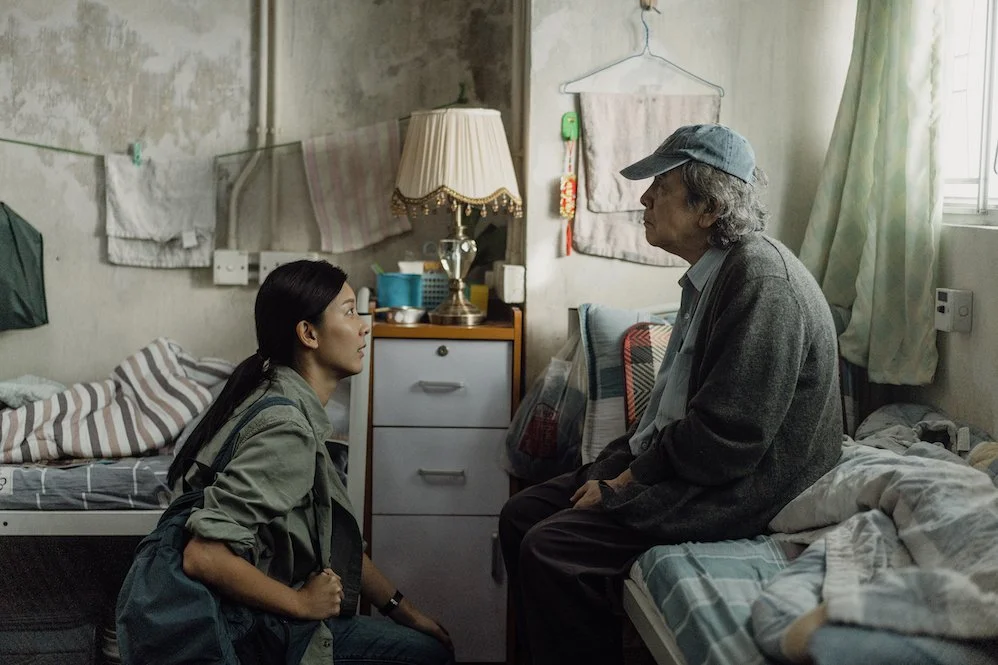Plea for the Fifth
Lawrence Kan directs an emerging all-star cast in a dogged reporter drama that’s by-the-book in all the right ways.
In Broad Daylight
Director: Lawrence Kan • Writer: Lawrence Kan, Li Fung, Tong Chui-ping
Starring: Jennifer Yu, Bowie Lam, David Chiang, Leung Chun-hang, Peter Chan, Rachel Leung, Henick Chou, Chu Pak-hong
Hong Kong • 1hr 46mins
Opens Hong Kong November 2 • IIA
Grade: A-
Back in 2016, Ming Pao (!) broke a news story about rampant neglect and abuse at a for-profit residential care home (Bridge of Rehabilitation Company), which turned out to be one of many that followed. The facility was slammed with one accusation after another about its brutal mistreatment of its elderly residents, peaking with sexual abuse claims against its manager. He skated because the victim was mentally challenged and the court decided she was unfit to testify. The kicker was the Social Welfare Department supposedly knew about the accusations and paid lip service, at best, to addressing them.
Lawrence Kan Kwan-chun’s In Broad Daylight | 白日之下 is the movie version of that story, using a disillusioned journalist, Kay (Golden Horse nominee Jennifer Yu Heung-ying, Far Far Away) as our entry point into not only the mess of a care home, but the simultaneously heroic and grim role of journalists in the world at large – at a time when good ones are succumbing to fatigue, capitalist drive, frustration and persecution. Granted In Broad Daylight is more Spotlight and She Said – about sexual misconduct and abuse of the voiceless – than All the President’s Men and Good Night, and Good Luck, which of course were about speaking truth to power. But it’s still a polished hymn to a free press and a must-see for anyone with a modicum of a conscience regarding the most vulnerable in our societies. It’s also the best Hong Kong film of 2023 so far.
Kan’s only other film credit so far has been When C Goes with G7, and he’s coming off the hit ViuTV drama In Geek We Trust, so this is quite a departure from both. Those were kinda sorta episodic dramas about next gen life and neither was as fired up and clearly pissed off as In Broad Daylight. When we meet A1 reporter Kay, she’s going to visit her grandfather, Tung (David Chiang Da-wei, It Remains), at the Rainbow Bridge Care Home. He’s confused; he doesn’t quite remember her but he’s elderly. It’s to be expected. What’s really going on, of course, is that Kay is pretending to be his granddaughter so that she can snoop around and find out about abuses she’s been tipped off about. Among the victims are nearly all the elderly residents, who get herded onto a rooftop and hosed off like HAZMAT workers as a shower, and Siu-ling (Golden Horse nominee Rachel Leung Yung-ting, The Sparring Partner, whose heartbreaking performance is proof that she might be the industry’s most compelling young actor) and Ming (Henick Chou Hon-ning, A Light Never Goes Out), both with developmental difficulties. Leading the charge of grossness are centre director Cheung Kim-wah (Golden Horse nominee Bowie Lam Bo-yi, A Guilty Conscience) and his own personal Nurse Ratched (Baby Bo Pui-yu).
On the A1 office side, though Kay and her crew of investigative reporters have video evidence and what they’ve seen with their own eyes, as well as their own Deep Throats, her editor (Chu Pak-him) insists they get more, otherwise it’s not news, “it’s misinformation.” They do, and what comes to light is a blistering indictment of institutionalised corruption and mismanagement, systemic failures and a lack of administrative will to fix any of it. It gets worse when Kay finds out Cheung has a string of sexual assaults to his credit, the latest being of Siu-ling.
In Broad Daylight is hardly groundbreaking in its depiction of over-taxed systems that are frequently susceptible to exploitation and the influence of bad actors (it doesn’t have to be), but it’s also a solid entry into the deep sub-genre about journalists doing necessary dirty work and getting very little for it. Journalism, especially these days, is a calling, like nursing or teaching; no journalist takes the job to get rich and famous. Kan and co-writers Li Fung and Tong Chui-ping take every opportunity, too, to lament the state of the fifth estate, rolling in ominous dialogue about whether or not journalism will even exist in a decade. They have a point. Look around. The evidence journalism is being crushed by corporate and bureaucratic interests, or withering on the vine (thanks Twitter, or X or whatever your fucking name is) is everywhere. Put together with a brief turn by Chu Pak-hong as a prosecutor who knows all too well how hard actually nailing a rapist is, Wu Fung as Tung’s neglected roommate Shui, and Peter Chan Charm-man (Everyphone Everywhere) as jaded resident Sam, who shrugs off how Rainbow serves up expired food, and you have Hong Kong’s bleakest film of the year too.
Kan (wisely) makes sure to include the downside of that free press in the film’s closing moments, after Kay’s zealousness gets results that also put dozens of people on the street. But therein lies the rub Kan is asking us to consider. At a time when legit journalists are being vilified and accused of fakery Kay and her crew are also drawn as doing the right thing and having to deal with some crappy blowback. Unfortunate but lest we forget Facebook and Twitter don’t have ethics standards and demand three independent sources and so they’re not reliable news sources. Kan allows Kay to be flawed, and lets the warts of her work show. It doesn’t make her wrong. — DEK



